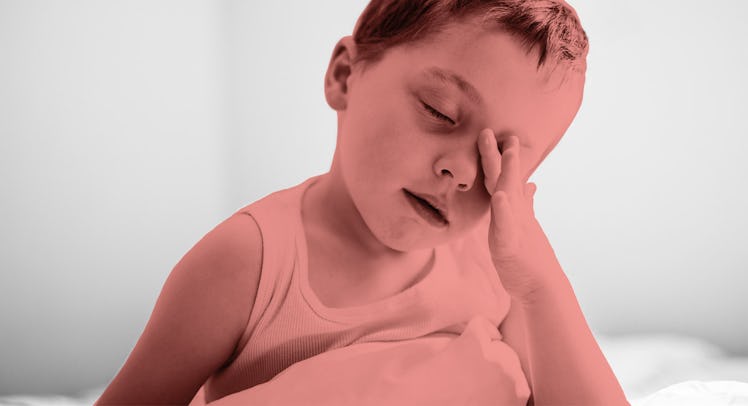How to Get a Kid Back to Sleep During the “Sleep Regression”
Whether it’s hunger, thirst, or growing pains, there are ways to get a kid back to sleep after a late-night outburst and all of them require calm and quiet.

Once parents have trained their kid to sleep, they may feel like the worst is over. Sadly, no. They can expect the “four-month sleep regression,” the disruption of transferring to a toddler bed, and for what will seem like perpetuity, a regular variety of infuriating night ailments. But there’s no reason to feel hopeless against hunger, thirst, urine, leg cramps, discomfort, and viruses. All parents need is a little preparation, some creative thinking, and a firm resolve that kids can take responsibility for a ton of their own needs.
“Foreseeing what they wake up for and then trying to make them as self-sufficient as possible really does help,” explains American Academy of Pediatrics spokesperson Dr. Corinn Cross. She notes that the core strategy of dealing with late-night complaints that will wake a kid up is keeping them contained in their room or bed. “If a kid is going to wake up and walk down the hall to you they are going to be way more awake than if they wake up and just take care of it themselves.”
She also stresses that much of the nighttime ailments are simply behaviors meant (however innocently) to get them closer to their parents. Cross is a huge proponent of boundaries, and notes that even with her own three children, she is the least enjoyable parent to deal with at night.
“Sometimes you just have to be super strict about it,” she explains. “Because if you entertain all of these nighttime visits then it just becomes a great time to visit with mom and dad.”
How to Deal With a Kid’s Common Nighttime Ailments
- Set firm boundaries so children understand that saying they are thirsty or hungry will not get them the attention they are seeking from you.
- Give kids tools they need to take responsibility for their own nighttime comfort, including proper sleepwear, pre-bed potty time, and bedside water.
- Leg cramps, or “growing pains” should be addressed with plenty of water, potassium, and iron-rich foods to fend off night cramping.
- Prepare for nighttime cold and flu intervention by offering honey, extra pillows, and preparing medicine for late night dosing in a dim quiet room.
But enforcing those boundaries also means providing children with the means to address their night issues on their own, or not develop them in the first place. So pre-bed should include going to the bathroom, whether they feel like they have to or not, for instance. Kids who get thirsty should have a no-spill water bottle beside their bed. Kids who get cold should have pajamas with feet. And kids who get warm should be able to toss off a blanket easily.
Cross notes parents can get even more creative. She points to how one of her kids went through a brief period of nighttime potty waking. “I put down one of those plastic mats for dogs right in her bedroom,” Cross says. “I told her to just get up and use it and go back to bed. Eventually, she got over the hump.”
But some sleep-triggered ailments actually result in physical discomfort that requires a parent to wake up. One of the most pernicious of these are “growing pains.” But these pains aren’t related to growing as much as they are related to dehydration, mineral imbalances, and overuse. Cross recommends making sure a child is getting enough water, potassium (from bananas), and iron rich foods. She suggests avoiding getting into the habit of late night leg massages, which can derail sleep habits in a major way.
Parents will also need to rise and intervene in cases of sickness, like cold and flu. But here too, the key is preparation. In the midst of a viral infection, Cross recommends prepping all pain and fever relievers prior to a kid laying down so that they can be administered quickly in low light. She also notes that loosening up congestion with a few minutes in a steamy bathroom can help. Also, parents should add a pillow to raise a child’s head.
Finally, Cross says look to the power of honey. “Honey has been shown to be as effective a cough suppressant as Robitussin,” she says. “It also has antiviral properties.” A coated teaspoon will do the trick. Just don’t ever give the stuff to babies or you’ll end up compounding the problem.